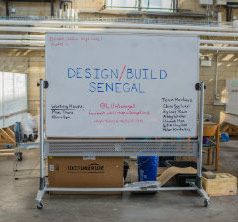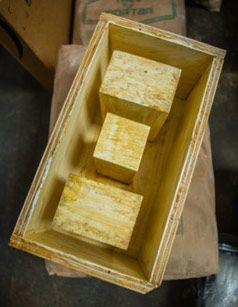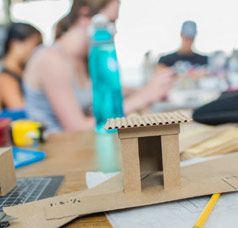This summer, Chris Guilcapi ’18, Hannah Han ’15, Abby Winter ’15, Ellie Hayden ’17, Eli Hess ’17, Sydney Kam ’15 and Peter Kostakos ’16 will construct a 2-by-2-meter home of concrete blocks and corrugated steel on Lehigh’s Mountaintop Campus. The students will use this small building, a model of a typical Senegalese living space, as a control for their Mountaintop project, which aims to improve the building components of West African homes.
Team members spent their first two weeks on Mountaintop researching and brainstorming, choosing focus areas and assigning tasks. They began testing different ratios of cement to sand to water to develop just the right building blocks. However, in this case, modern technology is not at their disposal. They will not take advantage of the cement mixer offered by another team; nor will they purchase a just-add-water cement mix from Lowe’s. They are mixing their cement by hand: an “authentic Senegalese experience,” as Hayden writes on the project’s blog. The physical, messy work of this project just beginning.
“The ultimate goal is looking at replicating the [building] process, understanding the process, but then also being able to do the research that the [Senegalese] builders don’t have the time or the capacity to do,” says mentor Susan Kart, assistant professor of art history and Africana studies.
That research includes finding ways to improve ventilation within a building while preventing malaria-bearing mosquitoes from entering.
The control building will sit outside the former Bethlehem Steel research bays that now serve as home to the Mountaintop project, baking in the sun as it would in Senegal. Students, in the meantime, will learn even more about design and construction through research, professional mentorship and trial and error; develop a deeper understanding of Senegalese culture through a visit to the Senegalese community in New York City; and, hopefully, come up with unique and viable solutions for Senegalese builders.
At Mountaintop, the team has the time, resources and freedom to explore and test new and innovative solutions, comparing the results of smaller scale models with those of the control building. They can afford to make mistakes, whereas Senegalese builders cannot.
“The ideal goal would be that we come up with something that’s culturally acceptable enough and easy enough and cost-effective enough that it creates an internal demand,” says mentor Mark Orrs, director of the sustainable development program at Lehigh and professor of practice in political science. “We understand that in terms of culture you don’t really mess with food and you don’t really mess with housing. ... So the idea of using what they’re already doing and trying to make minor modifications that have really big impacts, I think, is somewhat unique to this approach.”
Read the full story at the Lehigh University News Center.
-Kelly Hochbein is a writer with Lehigh University Media Relations.



